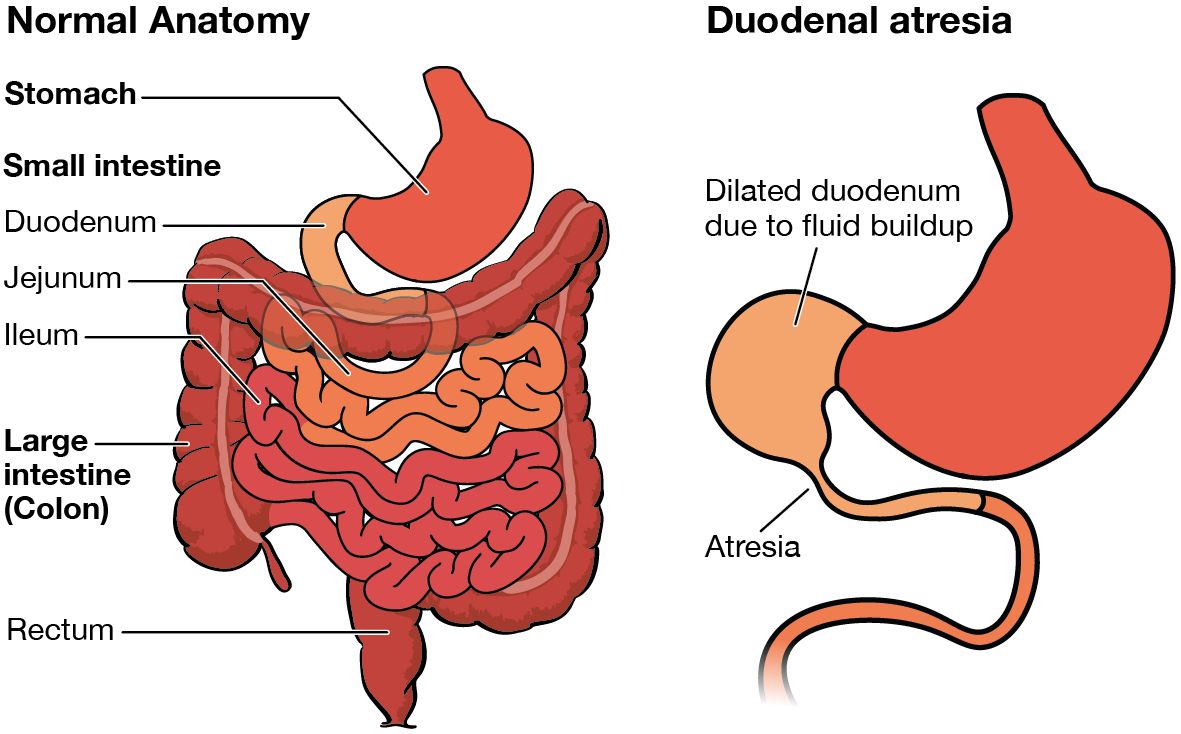What is bowel obstruction?
There are many causes of bowel obstruction in a fetus. Most are caused by an atresia, a narrowing at some point in the intestine. Most atresias occur in the small intestine but they can occur in the large intestine. A bowel obstruction is named by the place in the small intestine where it occurs:
- Duodenal atresia — the duodenum (the segment of the small intestine connected to the stomach)
- Jejunal atresia — the jejunum (the segment of the small intestine after the duodenum where most the liquid in food is absorbed)
- Ileal atresia — the ileum (the segment of the small intestine which empties into the large intestine)
- Colon atresia — the large intestine (which is also called the colon).

What is the outcome for a fetus with a bowel obstruction?
Your fetus’s bowel obstruction may have been discovered one of two ways. You may have undergone a routine ultrasound which showed a segment of bowel which was dilated, or larger than normal. This is a clue to your doctor that there is a problem with the intestine. This dilation happens because while in the uterus the fetus constantly swallows amniotic fluid. This narrowing can slow down or stop the flow of amniotic fluid in the intestine causing it to swell, so that is appears too large in an ultrasound.
The second way a bowel obstruction can be discovered is by the development of polyhydramnios, (the build up of too much amniotic fluid). Because of the blockage in the intestine, the normal flow of amniotic fluid is stopped. It accumulates on the outside of the baby- inside your uterus. Your uterus size may suddenly grow very large alerting your doctor to a possible problem. Your doctor may then order an ultrasound study. The ultrasound study can confirm a problem in the intestine of your fetus.
For women whose fetuses have a bowel obstruction, it is important to have a thorough evaluation of the condition. This might include an ultrasound, a fetal echocardiogram (a special ultrasound to look at the baby's heart), and an amniocentesis. Some fetuses with bowel obstruction have abnormal chromosomes. An amniocentesis is recommended because it can determine not only the sex of the baby, but whether or not there is a problem with the chromosomes. Your amniotic fluid level and the growth of your baby will be watched carefully(link to becoming a new patient). Time intervals for ultrasound studies are decided on an individual basis. You may be at risk for a delivery before your due date because polyhydramnios (extra amniotic fluid) can lead to preterm labor. You and your obstetrician will determine your delivery plan.
What will happen after birth?
Your baby should be born at a hospital with an intensive care nursery and a pediatric surgeon. Soon after birth your infant will have surgery to repair the abnormal piece of intestine. The pediatric surgeon will repair your baby's intestine in one of two ways.
If the stricture, or narrowing, is small the surgeon may be able to remove the damaged segment, taper the dilated portion, and sew the two ends of the intestine together. If the narrowing is long, or if the surgeon believes the intestine is damaged and cannot be used for a period of time, a temporary stoma or ostomy may be placed. A stoma is a surgically created opening in the abdomen in which the small bowel is brought out through the abdominal wall. It is through this opening, or stoma, that stool will pass. With the stoma in place, the baby will not pass stool through the anus. The use of a stoma is usually temporary and the baby will need another operation to reconnect the intestine and close the stoma.
It is not possible before birth to known which surgical repair will be performed. The surgeon will make that decision in the operating room after looking at the intestine. Babies with bowel obstruction can stay in the hospital from one week to one month, depending on the amount of intestine involved in the defect. The return of the function of the gastrointestinal tract and the baby's ability to tolerate feedings are two things which determine length of stay in the hospital. Babies are discharged from the hospital when they are taking all their feedings by mouth and gaining weight. Most babies with bowel obstruction do not have long-term problems.
After discharge from the hospital, your baby is at risk for bowel obstruction due to scar tissue or a kink in a loop of bowel caused by the first operation. Symptoms of bowel obstruction include:
- bilious (green) vomiting
- a bloated stomach
- no interest in feeding
If any of these symptoms occur, you should contact your pediatrician immediately.
Support Groups & Other Resources
- March of Dimes — Researchers, volunteers, educators, outreach workers and advocates working together to give all babies a fighting chance
- Birth Defect Research for Children — a parent networking service that connects families who have children with the same birth defects
- Kids Health — doctor-approved health information about children from before birth through adolescence
- CDC - Birth Defects — Dept. of Health & Human Services, Centers for Disease Control and Prevention
- NIH - Office of Rare Diseases — National Inst. of Health - Office of Rare Diseases
- North American Fetal Therapy Network — NAFTNet (the North American Fetal Therapy Network) is a voluntary association of medical centers in the United States and Canada with established expertise in fetal surgery and other forms of multidisciplinary care for complex disorders of the fetus.